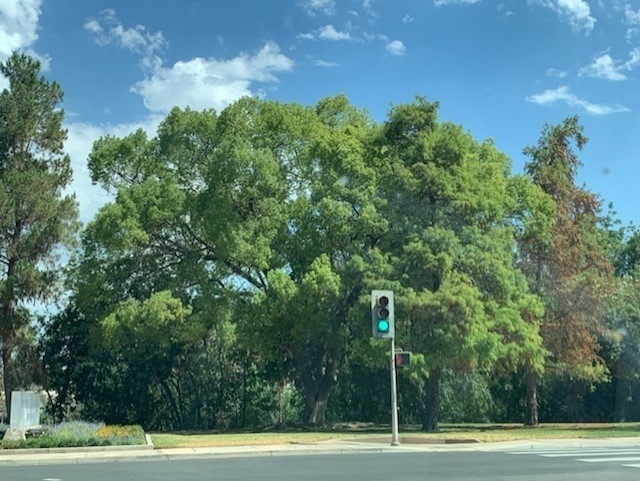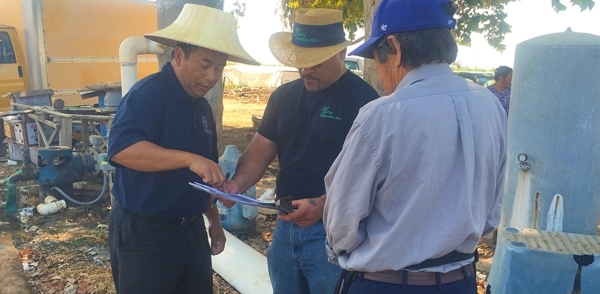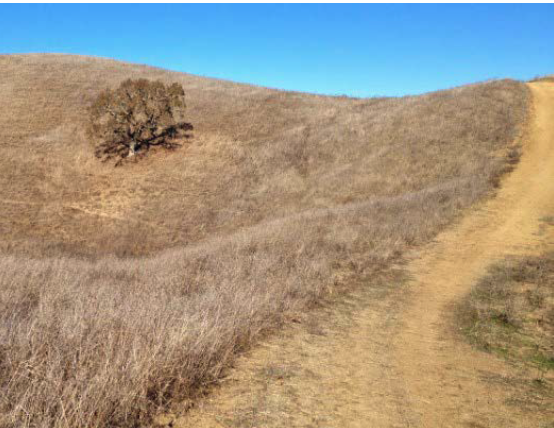Posts Tagged: SAREP
Lawn-pocalypse! Surviving Drought
Ah, summer! The season of sunburns, pool parties, and… lawn droughts. If your once lush, green carpet now looks like a crunchy brown doormat, you're not alone. Let's dive into why your yard is staging a dramatic death scene and what you can do to...

Bermuda grass and weeds overtaking drought stressed turf grass.
UC SAREP funds 8 sustainable food and farming projects
Projects will support socially disadvantaged farmers, increase urban access to healthy food and more
The UC Sustainable Agriculture Research & Education Program (SAREP) is pleased to announce the recipients of the Sustainable Agriculture and Food Systems 2024-25 Small Grants Program. This grant program will fund planning, research and education projects that support the development of sustainable community food systems and environmentally sound and economically viable farming enterprises.
Of the 33 eligible applications, eight applicants were selected to receive approximately $80,000 in combined funding to support their work. Individual grants are limited to $10,000. “The Small Grants Program is an important part of our mission,” said Ruth Dahlquist-Willard, interim director of UC SAREP. “By facilitating these grants, SAREP is able to support ANR in engaging a wide range of food systems stakeholders, outcomes show that a small financial investment can have a large impact in improving the lives of Californians.”
The eight recipients of this year's grants are:
Planning
Building Capacity and Resiliency Among Networks of Socially Disadvantaged California Farmers
Fresh Approach will establish a network of pooled learning and technical support that will aid emerging food-aggregation businesses in accessing sustainable market channels, including emergency food distribution. As part of the project, they will enhance an interactive GIS mapping tool of value chains to streamline market opportunities for socially disadvantaged farmers and aggregators. (Project lead: Andy Ollove, Fresh Approach)
Sustainable Urban Resident Food Gardens Expansion Planning Project
Growing Hope Gardens will systematize the process of outreach, discovery, design, planning and implementation in creating new urban resident food gardens. The project will document Growing Hope Gardens' garden development process into a training and implementation manual to more effectively duplicate food garden programs in more low-income urban communities. (Project lead: Carolyn Day, Growing Hope Gardens)
Research
Evaluating Best Management Practices for Cover Crops to Minimize Nitrogen Losses in California's Salinas Valley
This project will quantify the effectiveness of cover cropping at different planting times and termination dates to scavenge excess nitrogen in the soil and reduce nitrate leaching in a Salinas vegetable cropping system. The results will inform Ag Order 4.0 for cover crop credits and help stakeholders in the Salinas Valley better understand crop management for efficient nutrient cycling. (Project lead: Scott Fendorf, Stanford University)
Implications of American Kestrel Diet, Dispersal and Migration on Pest Control in Northern California Farming Systems
Investigators will study how the diet, post-breeding dispersal, and migration of nesting kestrels influences biological pest control on Northern California farms. The project will generate management recommendations for using the predatory bird for biological pest control in sustainable agriculture programs across California. (Project lead: Breanna Martinico, UC Cooperative Extension)
Education and Outreach
EAT! Community Farms Market Access and Promotion Project
This project helps socially disadvantaged and indigenous farmers in Riverside County create pathways for realizing economic return. EAT! will provide mentoring for marketing strategy development, connect farmers to buyers, promote the farmers market so it's more profitable for farmers, and provide a cooperative farm stand in the city of Norco for farmers to sell produce directly to consumers. (Project lead: Patrick Mitchell, Ecological Agricultural Training Cultural Center [EAT!])
Cultivating Cooperative Education, Stewardship and Connection at the Agroecology Commons Cooperative Incubator Farm
Agroecology Commons aims to address challenges faced by young, first-generation, BIPOC, queer and femme farmers at the Agroecology Commons Cooperative Incubator Farm in the Bay Area. The project will focus on education and outreach, providing technical assistance and training in regenerative agriculture practices such as soil health, pest management and crop diversification to socially disadvantaged farmers. (Project lead: Jeneba Kilgore, Agroecology Commons)
Signage and Mural Refurbishment for Southeast Asian Farmers to Improve Direct-to-Consumer Marketing
This project will build new, long-lasting farm signs for Southeast Asian farmers growing diversified vegetables and berries in the Sacramento region. Improving the appeal and durability of farm signs will increase the profitability of the farm stands as these resource-limited farmers rely on direct-to-consumer marketing strategies to promote their businesses. (Project lead: Margaret Lloyd, UC Cooperative Extension)
Community Nutrition Security and Education Program
Farm Discovery at Live Earth will increase access to organic produce for individuals and families experiencing food and nutrition insecurity in the Santa Cruz and Monterey Bay area. This will be accomplished through farming, outdoor education and nutrition education programs focusing on regenerative agricultural practices to connect youth and families to their regional agricultural and ecological systems. (Project Lead: Jessica Ridgeway, Farm Discovery at Live Earth)
The UC SAREP Small Grants Program has a big impact! Help us fund more projects that support sustainable community food systems and environmentally sound, economically viable farming enterprises. To support this program, please donate here. Choose SAREP Small Grants Program for the designation.
SAREP, Small Farms and UC Master Food Preservers join forces to strengthen support for sustainable production, local food systems and farmer equity
Dahlquist-Willard named interim SAREP director
The past few years have intensified challenges to sustainability in California agriculture. At the same time, new opportunities for UC ANR programs to meet these challenges have arisen. Large-scale hiring, successfully competing for several multimillion-dollar grants, and expanding our reach to meet the needs of Californians are among UC ANR's recent positive developments. As we look ahead, the challenges to achieve sustainability, food security and economic development present new opportunities for our programs to work together.
UC ANR's Sustainable Agriculture Research and Education Program is a leader in promoting safe, sustainable farming practices across the state. The recent retirements of SAREP's director and business manager, as well as multiple recent large grant awards for statewide and regional projects, have created an opportunity to integrate key programs under SAREP to meet grant deliverables and provide administrative support efficiencies. Thus, we are integrating the Small Farms Network and UC Master Food Preserver program with SAREP to form a new framework for support and administration.
These three programs have multiple shared areas of focus and activity such as local food production and marketing, diversified farming systems, food safety and enhancing equity. By integrating these units, we will not only accomplish economies of scale but also foster collaboration on shared focus areas to strengthen overall program delivery to clients and communities. The programs will retain their individual names and identities under this new framework.
Due to the substantial changes to the SAREP director position, the search for a new SAREP director is on hold while we consider how best to integrate the three programs. I have appointed Ruth Dahlquist-Willard to serve as interim director of SAREP for three years effective July 1, 2023.
Over the next six to nine months, Ruth will coordinate brainstorming sessions with academics and staff to gather input on how best to leverage shared interests and resources across the units. She will remain based in Fresno during the interim role. Recruitment will begin soon for the UCCE small farms and specialty crops advisor position in Fresno County, and Ruth will be dedicated 100% to the SAREP director position following this transition.
I am confident that this new structure will strengthen each individual program while also creating new synergies within a powerful statewide unit that can support multiple projects and attract new funding opportunities.
Please join me in congratulating Ruth and lending your support to her in establishing this new framework to accomplish our collective goals.
Glenda Humiston
Vice President
Climate-Change Resources
University of California UC ANR Green Blog (Climate Change and Other Topics) https://ucanr.edu/blogs/Green/index.cfm?tagname=climate%20change (full index)
Examples:
- Save Trees First: Tips to Keep Them Alive Under Drought https://ucanr.edu/b/~CdD
- Landscaping with Fire Exposure in Mind: https://ucanr.edu/b/~G4D
- Cities in California Inland Areas Must Make Street Tree Changes to adapt to Future Climate https://ucanr.edu/b/~oF7
Drought, Climate Change and California Water Management Ted Grantham, UC Cooperative Extension specialist (23 minutes) https://youtu.be/dlimj75Wn9Q
Climate Variability and Change: Trends and Impacts on CA Agriculture Tapan Pathak, UC Cooperative Extension specialist (24 minutes) https://youtu.be/bIHI0yqqQJc
California Institute for Water Resources (links to blogs, talks, podcasts, water experts, etc.) https://ciwr.ucanr.edu/California_Drought_Expertise/
UC ANR Wildfire Resources (publications, videos, etc.) https://ucanr.edu/News/For_the_media/Press_kits/Wildfire/ (main website)
-UC ANR Fire Resources and Information https://ucanr.edu/sites/fire/ (main website)
-Preparing Home Landscaping https://ucanr.edu/sites/fire/Prepare/Landscaping/
UC ANR Free Publications https://anrcatalog.ucanr.edu/ (main website)
- Benefits of Plants to Humans and Urban Ecosystems: https://anrcatalog.ucanr.edu/pdf/8726.pdf
-Keeping Plants Alive Under Drought and Water Restrictions (English version) https://anrcatalog.ucanr.edu/pdf/8553.pdf
(Spanish version) https://anrcatalog.ucanr.edu/pdf/8628.pdf
- Use of Graywater in Urban Landscapes https://anrcatalog.ucanr.edu/pdf/8536.pdf
- Sustainable Landscaping in California https://anrcatalog.ucanr.edu/pdf/8504.pdf
Other (Non-UC) Climate Change Resources
Urban Forests and Climate Change. Urban forests play an important role in climate change mitigation and adaptation. Active stewardship of a community's forestry assets can strengthen local resilience to climate change while creating more sustainable and desirable places to live. https://www.fs.usda.gov/ccrc/topics/urban-forests
Examining the Viability of Planting Trees to Mitigate Climate Change (plausible at the forest level) https://climate.nasa.gov/news/2927/examining-the-viability-of-planting-trees-to-help-mitigate-climate-change/
Reports and other information resources coordinated under the auspices of the United Nations and produced through the collaboration of thousands of international scientists to provide a clear and up to date view of the current state of scientific knowledge relevant to climate change. United Nations Climate Action
Scientific reports, programs, action movements and events related to climate change. National Center for Atmospheric Research (National Science Foundation)
Find useful reports, program information and other documents resulting from federally funded research and development into the behavior of the atmosphere and related physical, biological and social systems. Search and find climate data from prehistory through to an hour ago in the world's largest climate data archive. (Formerly the "Climatic Data Center") National Centers for Environmental Information (NOAA)
Think tank providing information, analysis, policy and solution development for addressing climate change and energy issues (formerly known as the: "Pew Center on Global Climate Change"). Center for Climate & Energy Solutions (C2ES)
Mapping Resilience: A Blueprint for Thriving in the Face of Climate Disaster. The Climate Adaptation Knowledge Exchange (CAKE) was launched in July 2010 and is managed by EcoAdapt, a non-profit with a singular mission: to create a robust future in the face of climate change by bringing together diverse players to reshape planning and management in response to rapid climate change. https://www.cakex.org/documents/mapping-resilience-blueprint-thriving-face-climate-disaster
Cal-Adapt provides a way to explore peer-reviewed data that portrays how climate change might affect California at the state and local level. We make this data available through downloads, visualizations, and the Cal-Adapt API for your research, outreach, and adaptation planning needs. Cal-Adapt is a collaboration between state agency funding programs, university and private sector researchers https://cal-adapt.org/
Find reports, maps, data and other resources produced through a confederation of the research arms of 13 Federal departments and agencies that carry out research and develop and maintain capabilities that support the Nation's response to global change. Global Change (U.S. Global Change Research Program)
The Pacific Institute is a global water think tank that combines science-based thought leadership with active outreach to influence local, national, and international efforts to develop sustainable water policies. https://pacinst.org/our-approach/
Making equity real in climate adaptation and community resilience policies and programs: a guidebook. https://greenlining.org/publications/2019/making-equity-real-in-climate-adaption-and-community-resilience-policies-and-programs-a-guidebook/
Quarterly CA Climate Updates and CA Drought Monitor Maps (updated each Thursday) https://www.drought.gov/documents/quarterly-climate-impacts-and-outlook-western-region-june-2022
Drought focus of Water Resources IMPACT magazine special issue
UC ANR experts address emotional toll of drought
Preparing the American West for prolonged drought is the focus of a double issue of Water Resources IMPACT magazine. The California Water Commission staff are guest editors for this special open-access edition of the magazine, which is published by the American Water Resources Association.
Faith Kearns, academic coordinator of University of California Agriculture and Natural Resources' California Institute for Water Resources, is among the authors delving into how drought impacts people and the environment and how we can better prepare for the inevitable.
The first issue, published on Feb. 14, focuses on water scarcity issues confronting California and the ways these issues affect different sectors.
In “Trauma, Care, and Solidarity: Addressing the Emotional Toll of Chronic Drought,” Kearns highlights the effects of drought on mental health. She points to the spike in suicide hotline calls when wells ran dry in Southeast Asian communities in California's Central Valley.
By listening to Southeast Asian farmers, Ruth Dahlquist-Willard and Michael Yang of UC Cooperative Extension were able to “lighten the load” for them by providing pragmatic support, Kearns writes.
“The scale of some of these highly emotional issues – drought, wildfires, climate change – can make them seem incredibly difficult, if not impossible, to deal with,” Kearns said. “At the same time, they are affecting everyone living in the western U.S. on a daily basis. I wanted to highlight and provide models based on work that people – whether they are researchers, clinical psychologists, or Cooperative Extension advisors – are doing right now to ease the way.”
The authors who contributed to the double issue are a diverse array of Tribal experts, academics, nongovernmental organization thought-leaders, water managers and water policy influencers, each of whom brings their own perspective on the topic of drought. Their expertise and perspectives in climate science, water policy and water management will help inform drought-related decision-making and support policies that better prepare the state to thrive during periods of prolonged water scarcity.
In addition to Kearns, the first issue includes articles contributed by:
- Samantha Stevenson, University of California, Santa Barbara
- Jay Lund, University of California, Davis
- Ron Goode, North Fork Mono Tribe
- Andy Fecko, Placer County Water Agency
- Jeff Mount, Public Policy Institute of California, and Ted Grantham, University of California, Berkeley/UC Cooperative Extension
- Nat Seavy and Karyn Stockdale, National Audubon Society
- Kjia Rivers, Community Water Center
- Cannon Michael, Bowles Farming
- Michelle Reimers, Turlock Irrigation District
The January/February edition of Water Resources IMPACT magazine can be accessed, free of charge, on the American Water Resources Association website at https://www.awra.org under “Publications.”
The second issue, to be published in March, will focus on drought response, considering the options for adaptation. This two-part series complements the Commission's work on strategies to protect communities and fish and wildlife in the event of a long-term drought.





